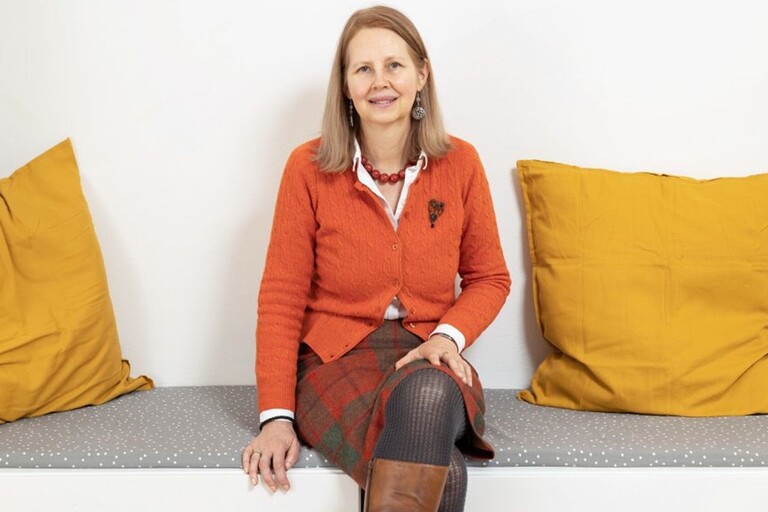New university centre offers not only spiritual support
Our society is going through a difficult period. When we were finally able to breathe out after two years of fear in pandemic isolation, a war started – the kind that many Europeans thought would never return to the Old Continent after the „crazy 20th century“, as Ivan Klíma refers to it...
It shook even the stronger individuals and made the need to take care of our inner stability ever more urgent. That, among other reasons, was why the Soul Care Centre of the Charles University was established. All students and university employees are welcome to come and talk about their fears, doubts and questions. Its doors are also open to the wider public. Symbolically, therefore, it has found a home in the Hybernská Campus, a joint centre of the Charles University and the City of Prague.
The authors of the idea to build the university centre, headed by professor Ivana Noble, were inspired by Jan Patočka and Plato when using the term „care for the soul“. Both philosophers talk about caring for the soul and “the bottom wave of our lives, where all our relationships, desires, frustrations and all that went wrong in our lives, all of that comes together,” explained Ivana Noble, professor at the Protestant Theological Faculty of the Charles University (PTF CU), head of the Ecumenical Institute of the PTF CU and now also head of the Soul Care Centre.
Surprisingly enough, the team found inspiration for the establishment of an interdisciplinary and interfaith centre, which welcomes people who do not subscribe to any religion, not at renowned foreign universities, which usually have well-run chaplaincies but are always closely linked to a church, but in Western prisons and hospitals. The pandemic showed how necessary such a centre is.
„For us, the Covid-pandemic period was a turning point because we saw that certain issues stated to emerge among our students, not only psychological, but also problems relating to value orientation and seeking where they actually belonged when they were physically isolated from others.“
Caring in Czech, Portuguese, and Ukrainian
Although the centre is based on a spiritual foundation, its team emphasises that it is open to members of all churches and denominations, as well as non-believers. Apart from Czech, it also offers its services in English, Italian, and Portuguese, and its team also cooperates with clergy who can speak Ukrainian.
Spiritual support
The basic programme offered by the centre is spiritual support – the opportunity to meet and talk with trained spiritual guides. „The life of the soul, as we understand it, takes place in relation to other people, to nature, to culture, to the political reality around us. The part that reaches beyond all this is called God by those who believe, and takes a personal form for them, but in some ways, we all reach out to what surpasses us and goes beyond.“ Many of the spiritual guides are trained in psychotherapy and there is also one psychiatrist on the team. Of course, the team also cooperates with psychological counselling services.
Group meditations
Once a month, group meditations open to the public will also be taking place at the Hybernská campus. “We have experienced meditation guides who use various practices, not only Christian, but also Buddhist and others. These can certainly help people find a stable point in their lives in a very open way, including people who come from very troubled environments, such as Ukrainian refugees,” pointed out professor Noble. „It is my hope that we will be able to touch on topics like hope and empathy in a specific way. To meet people whose homes, whose loved ones were taken away from them by war, whose lives were disrupted. When the war in Ukraine started, many of our staff were helping on the front line, and we have some pretty strong feedback about what they were experiencing. In addition, we work directly with Ukrainian refugees. We want to create an environment where the topic of war is not the only thing that is left for the migrants. Ukrainians need to work, to create, to experience their own personal value, which is not something that can only be based on compassion. It can also help the rest of us to see the bigger picture and relate the experience these people have to other problems we are experiencing here,“ emphasised professor Noble.
Don’t forget about your „soul hygiene“
And how does the head of the centre, professor Ivana Noble, take care of her own soul? “For me, time is a crucial aspect. Making time for meditation. Finding the time to calm down, to breathe in other forms of presence, to reflect on what I’m doing and what is happening in my life. I’m a pastor, so the practice of Sunday rituals is important to me – it is not just the worship, but also a way of resting. Once a year, my husband and I go to a one-week spiritual retreat, which is great for the hygiene of the soul. It is also important to me that I make time for seeing my friends. When I get too tired of talking, I paint. Painting makes me feel very relaxed, it’s a kind of inner conversation, a prayer. I like the fact that some of the Greek Church Fathers used the same word for attention and for prayer: for me, prayer is attention to God and to life in the details that it is made up of.”
Helena Zdráhalová, photos by Michal Novotný; editorially abridged


